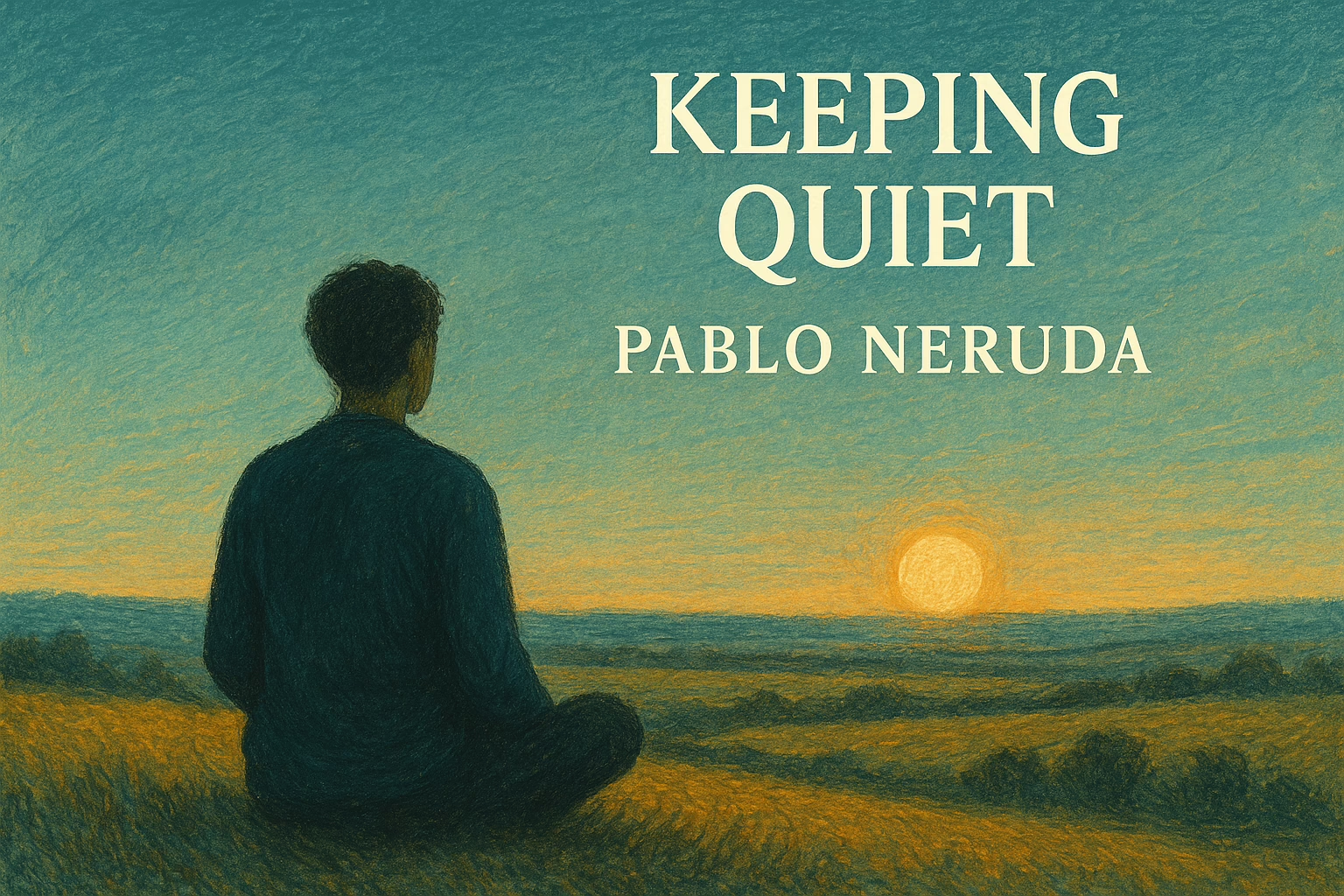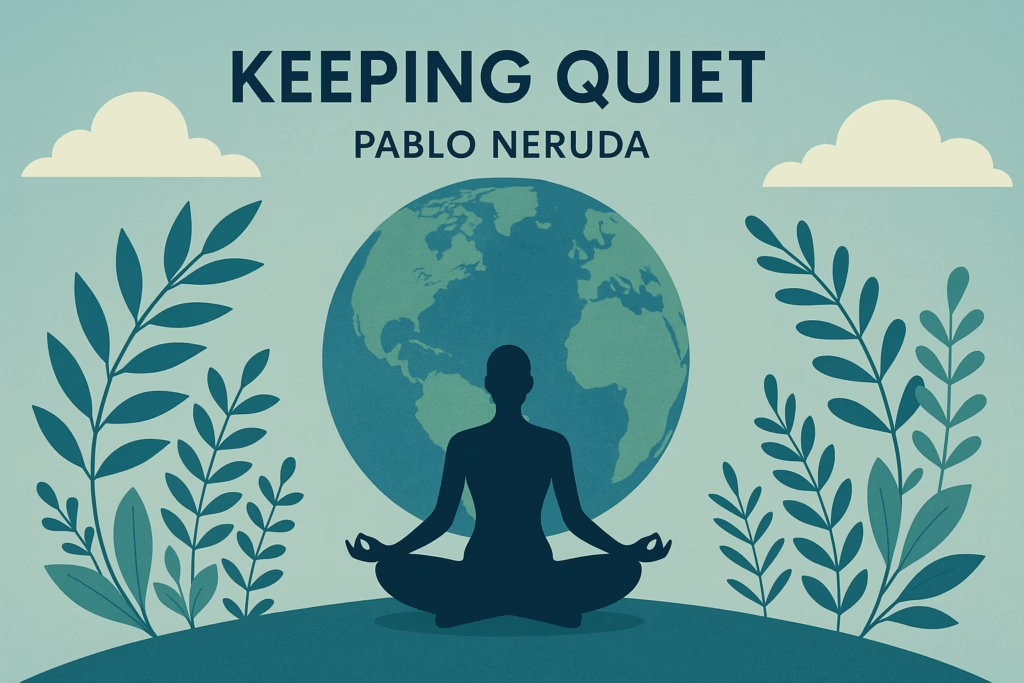Pablo Neruda’s Keeping Quiet is a poem that continues to captivate learners for its simplicity, depth, and universal appeal. Built around the idea of a momentary pause, the poem urges humanity to step back from constant activity and rediscover the value of introspection, compassion, and peace. Its themes—silence, unity, self-awareness, and the healing power of nature—make it especially relevant for students who are learning to engage critically with both poetry and the world around them.
To help readers explore these themes more effectively, this article presents a comprehensive set of extra CBSE-style questions designed to enhance understanding and strengthen exam preparation. These questions—ranging from factual recall to higher-order thinking—encourage students to reflect on Neruda’s imagery, message, and poetic technique. By engaging with these thoughtfully crafted prompts, learners can deepen their appreciation of the poem while also building the analytical skills needed for success in senior secondary examinations.

A. VERY SHORT ANSWER QUESTIONS (1 mark each)
1. What does the poet want everyone to do after counting to twelve?
He wants everyone to keep still and stop all activity.
2. What does the poet mean by “let’s not speak in any language”?
He wants everyone to avoid speech so that silence can unite all humans.
3. What kind of wars does the poet refer to as “green wars”?
Wars against nature, such as environmental destruction.
4. What does the man gathering salt notice during stillness?
Answer: His hurt hands.
5. What does the poet say about total inactivity?
He clarifies he is not advocating total inactivity or death.
B. SHORT ANSWER QUESTIONS (2–3 marks each)
1. How does silence become a means of introspection in the poem?
Silence allows people to stop their hurried activities and reflect on themselves, breaking the “sadness” of never understanding who they are.
2. Why does the poet refer to fishermen and whales?
To show that if humans paused their harmful actions, nature would be free from violence even for a moment.
3. What does Neruda mean by “a huge silence might interrupt this sadness”?
Meaningful silence can interrupt the sorrow caused by human ignorance, conflict, and self-destruction.
4. Why does the poet say, “I want no truck with death”?
Because his suggestion of stillness is aimed at renewing life, not encouraging inactivity or death.
5. How does the Earth act as a teacher in the poem?
The Earth appears lifeless in winter but revives in spring, symbolising that stillness is not death but preparation for renewal.

C. LONG ANSWER QUESTIONS (5–6 marks each)
1. Discuss the significance of the number twelve in the poem.
Twelve may symbolize the twelve hours of a clock, the twelve months of the year, or a universal number. It acts as a neutral, global symbol that belongs to everyone and marks a shared moment of pause.
2. How does Neruda use imagery to convey the need for peace?
Neruda uses contrasting images—fishermen who harm whales, the salt–gatherer’s hurt hands, and those who prepare deadly wars. Against this, he presents images of stillness, shade, and clean clothes. These visual contrasts highlight the destructive nature of human actions and the healing power of silence.
3. Explain the central idea of the poem “Keeping Quiet.”
The poem urges the world to pause, reflect, and embrace silence. It criticizes mindless activity, violence, and environmental destruction while promoting peace, unity, and self-awareness.
D. EXTRACT-BASED QUESTIONS (3–4 marks)
Extract 1:
“Fishermen in the cold sea
would not harm whales
and the man gathering salt
would look at his hurt hands.”
Questions:
- What change does the poet expect from fishermen?
- What does the salt-gatherer’s action symbolize?
- How does this extract relate to the theme of introspection?
Answers:
- He expects fishermen to stop harming whales during the moment of stillness.
- It symbolizes awareness of one’s own suffering, often ignored due to constant labour.
- It shows how silence allows people to reflect on their actions and their own pain.
Extract 2:
“What I want should not be confused
with total inactivity.
Life is what it is about;
I want no truck with death.”
Questions:
- What misunderstanding does the poet clarify?
- What does he mean by “no truck with death”?
- How does this stanza shift the direction of the poem?
Answers:
- He clarifies he is not asking for lifeless inactivity.
- He means he does not support ideas linked to death or extinction.
- It shifts the poem from stillness to a celebration of life and renewal.

E. MULTIPLE CHOICE QUESTIONS (MCQs)
- The poet asks us to keep quiet for—
A) Twelve minutes
B) One full day
C) One second
D) Twelve seconds
Answer: C - “Green wars” refer to—
A) Environmental destruction
B) Nuclear war
C) Space warfare
D) Cyber warfare
Answer: A - The Earth teaches us that—
A) Silence is boring
B) Appearances can be deceptive
C) Everything eventually dies
D) Stillness equals death
Answer: B
F. ASSERTION–REASON QUESTIONS
Q1.
Assertion (A): The poet wants people to stop their activities.
Reason (R): He believes this stillness will promote death.
- Answer: A is true, R is false.
Neruda explicitly says he wants “no truck with death.”
Q2.
Assertion (A): Silence can bring humans closer to self-understanding.
Reason (R): Humans are too busy to reflect on their own lives.
- Answer: Both A and R are true, and R correctly explains A.

G. VALUE-BASED / OPINION QUESTIONS
1. How can the poet’s message be applied to modern life dominated by technology and noise?
In modern life, people are constantly surrounded by digital noise—endless notifications, social media pressure, and fast-paced routines. The poet’s message encourages us to pause intentionally, disconnect from distractions, and create a moment of mental stillness. Practising short periods of silence can help reduce stress, improve focus, and allow individuals to reflect on their thoughts and emotions. Neruda’s idea of keeping quiet becomes a way to restore balance, mindfulness, and emotional well-being in a technology-driven world.
2. Do you think a moment of global silence could bring countries closer? Why or why not?
Yes, a moment of global silence could bring countries emotionally closer. Silence removes the boundaries of language, politics, and conflict—creating a shared experience that unites people at a deeper human level. As the poem suggests, when everyone pauses harmful activities and chooses stillness, hostility and aggression momentarily stop. This shared stillness can promote empathy, reduce tension, and open the possibility for peaceful dialogue.
(A student may also argue “No,” and that answer is acceptable too, if explained logically.)
3. What personal practices can individuals follow to encourage introspection, as suggested in the poem?
Individuals can cultivate introspection through simple habits such as:
- setting aside time each day for silence or meditation
- reducing unnecessary speech and listening more deeply
- taking breaks from constant activity or multitasking
- reflecting on personal choices, habits, and emotional responses
- spending time in nature, observing without judgement
These practices mirror Neruda’s message: by doing “nothing” for a moment, people can better understand themselves and break the cycle of mindless routine and stress.
The additional questions presented in this article aim to support a deeper and more meaningful engagement with Pablo Neruda’s Keeping Quiet. By approaching the poem from multiple angles—interpretive, analytical, reflective, and value-based—students gain a fuller understanding of its profound themes and its quiet yet compelling call for global introspection. These questions not only enhance exam readiness but also encourage learners to think critically about their own lives, the pace of modern society, and the importance of silence as a space for healing and self-awareness. Ultimately, this extended question set reinforces the poem’s enduring relevance and helps readers appreciate how Neruda’s vision of mindful stillness can enrich both literary study and everyday life.



